This academic year Elon University is celebrating the 10th anniversary of the dedication of the Numen Lumen Pavilion, home to the Truitt Center for Religious and Spiritual Life.
 A little more than 10 years ago, former University Chaplain Jan Fuller donned a neon green construction vest and white hardhat before being hoisted into the air in a red cherry picker. She was lifted skyward within what is now the Sacred Space of Elon University’s Numen Lumen Pavilion, which was dedicated in 2013 and is home to the Truitt Center for Religious and Spiritual Life and the Center for the Study of Religion, Culture, and Society.
A little more than 10 years ago, former University Chaplain Jan Fuller donned a neon green construction vest and white hardhat before being hoisted into the air in a red cherry picker. She was lifted skyward within what is now the Sacred Space of Elon University’s Numen Lumen Pavilion, which was dedicated in 2013 and is home to the Truitt Center for Religious and Spiritual Life and the Center for the Study of Religion, Culture, and Society.
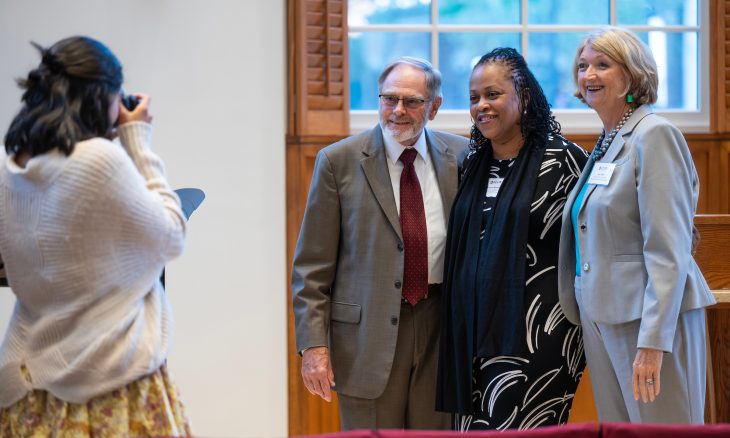
“The project foreman powered it up and we rose into the air to the oculus, which was at that time, a steel-rimmed hole in the roof,” Fuller recounted at a 10th anniversary celebration of the building’s dedication in October. “I blessed the space for all religions and glued a laminated sheet with symbols of the world’s great spiritual traditions, in the oculus. It remains there covered only by drywall and paint, describing and motivating all we do and have done here.”
And a lot has been done during the decade since the pavilion first opened its doors, with more to come in the decades ahead. The Numen Lumen Pavilion and the Truitt Center have become a central gathering place for people from across religious and spiritual faiths at Elon as the university has expanded its concentration on multifaith understanding and study. Marking an important milestone in the pavilion’s history this year, the university is looking to the future with a new giving campaign that will allow the university community to directly impact the ongoing work that happens within the center.
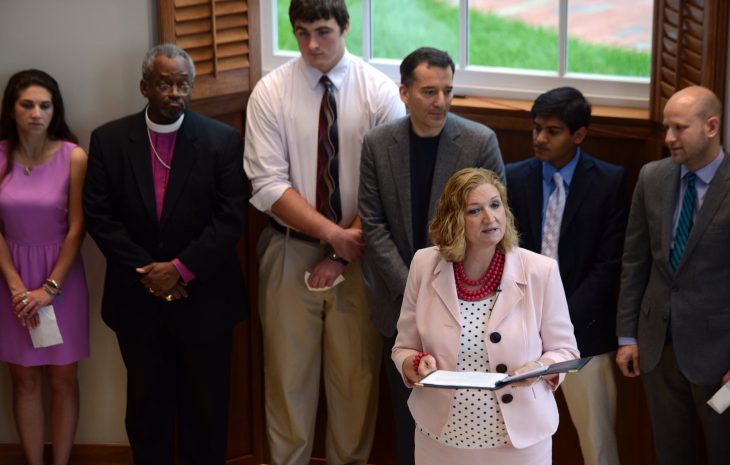
“We hope that the Numen Lumen Pavilion will continue to be a hub of religious, spiritual, and ethical cooperation, resources, learning, and engagement for the Elon community, and that the future work of the Truitt Center will focus on how to equip us to interact with empathy, cooperation, honesty, and joy. Using the world’s honored traditions as our guideposts, we hope to grow in our ability to engage the world around us with forthrightness and compassion, and to have respectful dialog across differences,” said Kirstin Boswell, University Chaplain and Dean of Multifaith Engagement.
The October gathering within the Numen Lumen Pavilion was filled with stories about how this unique facility has promoted understanding, scholarship and community. The pavilion draws its name from the university’s motto — Numen Lumen.
“The Numen Lumen Pavilion has been a space of solace, warmth, learning, and light for so many over the last 10 years and we hope will welcome so many more in the years to come,” Boswell said.
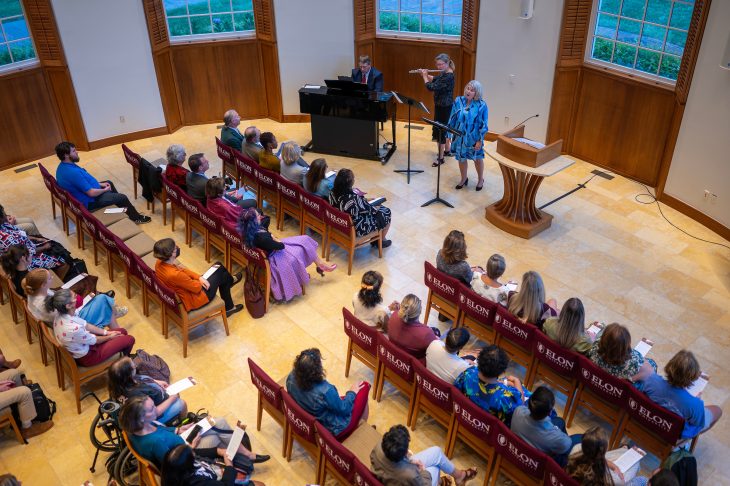
The foundation for the eventual construction of the Numen Lumen Pavilion was made possible by the philanthropy of the late alumna Edna Truitt Noiles ‘44, a steadfast supporter of her alma mater with her husband, Doug. Edna and Doug Noiles made a $1 million gift in 2003 to endow the Vera Richardson Truitt Center for Religious and Spiritual Life in honor of Edna’s mother. Noiles was recognized in 2016 with the Elon Medallion, Elon’s highest honor for service to the university.
University Chaplain Emeritus Richard McBride recounted at the gathering in October the direction he received from Edna Noiles following her gift to support the creation of the Truitt Center — “I want students to learn more about their own and other faiths, and I want them to live lives of reconciliation,” McBride said Noiles told him.
That mission has been central to the activities that fill the Numen Lumen Pavilion through the work and programming of the Truitt Center. At the pavilion’s dedication in 2013, students representing Elon’s religious and spiritual life organizations joined spiritual life leaders and six distinguished guests who later participated in Spring Convocation and a panel discussion about the need for multifaith understanding in a complex world.
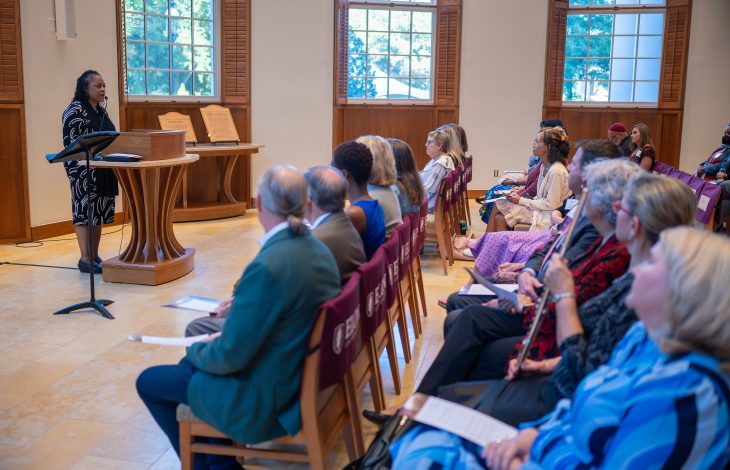
The pavilion is perhaps best known for its Sacred Space, a round, two-story room that is often flooded by light shining through its many windows. The building has a kitchen with two ends that easily separate for observance of kosher-style and halal food laws, ablution areas, prayer, mediation and study rooms, a library and a multipurpose room, the McBride Gathering Space, named to honor Chaplain Emeritus Richard McBride whose vision a decade ago helped make the building possible. The gathering space will be a setting for worship, receptions, meals and meetings.
Outside the building is a mediation garden with a Kugel ball fountain, a heavy granite ball that spins lubricated by a thin film of water, as well as rocks engraved with the words students offered at the site dedication: peace, agape, cooperation and understanding, healing the earth, koinonia, Namaste, nirvana, respect, oneness and charity.
Building multifaith understanding
The Numen Lumen Pavilion and Truitt Center have played important roles in expanding Elon’s focus on multifaith understanding, with the university releasing a new multifaith strategic plan in March. The Numen Lumen Pavilion had been included as a priority during the Elon Commitment, the university’s previous 10-year strategic plan, as was the establishment of the Center for the Study of Religion, Culture, and Society, which is headed by Professor Brian Pennington. The university’s previous multifaith strategic plan, “Engaging Religion/Building Community,” resulted in the creation of the Multifaith Scholars program, the student-led Ripple Interfaith Conference and the Interreligious Studies minor.
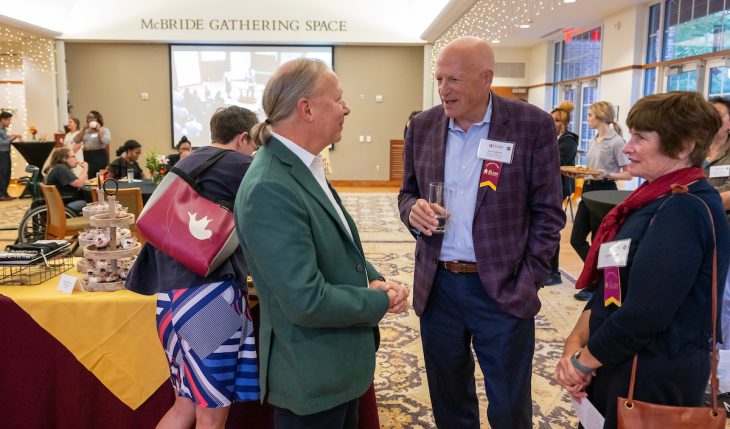
Pennington shared at the October gathering that the spaces within the Numen Lumen Pavilion have facilitated the academic pursuits and personal connections that are part of Elon’s growing effort to expand multifaith understanding.
“This role in this space has given me the opportunity to quietly make the case through programs and campus partnerships that academic success, intellectual discovery and critical thinking are by no means antithetical to spiritual growth,” Pennington said. “They are themselves a kind of spiritual growth.”
“The Multifaith Strategic Plan is at once a roadmap guiding our future work as students, faculty, and staff of all faiths and all belief systems, but is also a values document that emphasizes how central this work is to Elon’s core mission and purpose,” Boswell said. “We are involved in the crucial work of becoming ethical world citizens who engage nimbly around the central questions of identity, purpose, meaning, values, and justice.”
Fostering relationships
Central to the Numen Lumen Pavilion’s power has been its ability to foster relationships. At the October gathering, Boswell unveiled two new plaques for the pavilion, with the first recognizing the history of the land on which the pavilion and university now sit that had historically been occupied by the Eno, Tutelo, Saponi and Shakori Native people.
A second paid tribute to the dedication of an ark handcrafted by Father Peter Tremblay, associate chaplain for Catholic life, to house the sacred Torah of the Elon Jewish community.
The Numen Lumen Pavilion regularly brings people together for a variety of programs including weekly services for different religious communities, meetings of student organizations and gatherings of the yoga club, meditation club and gospel choir.
Among those students is Oliver Keicher, who said he connected during his first week at Elon with Rev. Julie Tonnesen, associate university chaplain and adviser to the student group LEAF (Lutherans, Episcopalians and Friends). “It was the first time since my parents had left that I felt safe and comfortable,” Keicher said. “I felt like Elon was becoming my home.”
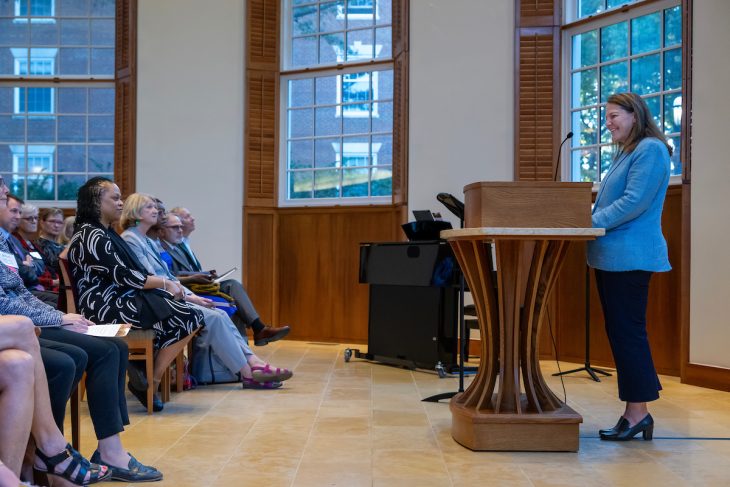
Makeda Sanders ‘26 said that the Numen Lumen Pavilion has provided a pathway to relationships through Jewish life activities that she would not have gained otherwise. “It’s been a welcoming community, even though I’m not fully Jewish, and I don’t practice the same faith as other people,” Sanders said. “Everyone’s very accepting and not judgmental.”
Interim Assistant Dean of Multifaith Engagement, Hillary Zaken said she hears from numerous students about how they feel seen, respected and celebrated for who they are in the Numen Lumen Pavilion, and there are opportunities to make more students aware of what the special dedicated multifaith space can provide.
Madison Williams ‘24 is a multifaith intern in the Truitt Center and said she has connected with people she would not have met otherwise and learn more about different cultures and faiths. “Through that opportunity, I became a multifaith intern, which led to me meeting people from different faiths and backgrounds that I never would have met if I hadn’t been coming to this space,” Williams said.
It was during her first year at Elon that Samira Foster ‘19, now assistant director of student care and outreach, realized the impact the Numen Lumen Pavilion and the people of the Truitt Center could have. She saw the pavilion as a place where she could let her guard down and come as she was, a place that is the background of so many of her core memories from her time at Elon. She said when she graduated, “I knew I was much more equipped to share my gifts with the world because of the meaningful relationships that fostered my growth and nurtured all that I was becoming,” Foster said during the October gathering. “For me, the Numen Lumen Pavilion is synonymous with home.”


